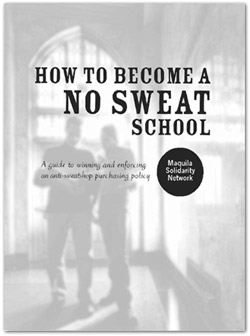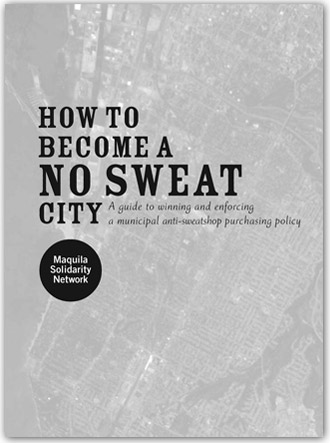WELCOME TO THE ARCHIVE (1994-2014) OF THE MAQUILA SOLIDARITY NETWORK. For current information on our ongoing work on the living wage, women's labour rights, freedom of association, corporate accountability and Bangladesh fire and safety, please visit our new website, launched in October, 2015: www.maquilasolidarity.org
 Ever wonder whether your school uniform or other school clothes were made in sweatshops or under humane working conditions? Students, teachers and support staff across Canada are asking their school boards to adopt No Sweat policies to make sure all school clothing is made under decent conditions. Through these actions, they are helping eliminate sweatshop abuses in the global garment industry.
Ever wonder whether your school uniform or other school clothes were made in sweatshops or under humane working conditions? Students, teachers and support staff across Canada are asking their school boards to adopt No Sweat policies to make sure all school clothing is made under decent conditions. Through these actions, they are helping eliminate sweatshop abuses in the global garment industry.
Many school boards have already adopted No Sweat policies, including at least 11 in Ontario. Nine Ontario Catholic school boards have affiliated with the Worker Rights Consortium, which is investigating factory conditions on their behalf. If you take action now, your school board could join them!
 The first Canadian No Sweat policy was passed at the University of Toronto in the spring of 2000. There are several No Sweat campaigns taking place in universities across the country. To date, No Sweat policies have been adopted by nineteen universities.
The first Canadian No Sweat policy was passed at the University of Toronto in the spring of 2000. There are several No Sweat campaigns taking place in universities across the country. To date, No Sweat policies have been adopted by nineteen universities.
 We don't usually think of governments as a source of "consumer power," but governments buy far more apparel than we do as individual consumers. Uniforms worn by city workers, police, and firefighters, as well as caps and T-shirts bearing city logos, are all bought or sold by municipal governments.
We don't usually think of governments as a source of "consumer power," but governments buy far more apparel than we do as individual consumers. Uniforms worn by city workers, police, and firefighters, as well as caps and T-shirts bearing city logos, are all bought or sold by municipal governments.
Municipal governments across North America have adopted No Sweat policies to ensure that cities do not purchase clothing made under sweatshop conditions. Local No Sweat coalitions are active in cities across Canada, working to persuade their municipalities to adopt ethical purchasing policies. Five Canadian cities (Vancouver, Toronto Ottawa, Calgary and Halifax) have adopted No Sweat purchasing policies, and a number of Canadian cities have adopted resolutions in favour of No Sweat policies, an important first step toward developing and implementing such policies.
Several US States have passed laws to ensure that the State government will not purchase clothing made under sweatshop conditions, and that suppliers make public the locations of the factories where clothes are made. As of January 2007, one Canadian province (Manitoba) has adopted a No Sweat procurement policy.
Many public employees and some private sector workers wear uniforms purchased or selected by their employers - school janitors and maintenance people, hospital and nursing home employees, postal workers, fire fighters, prison guards, airline employees, etc.
Some unions have already achieved "Union Label" purchasing policies through collective bargaining. Those policies require the employer to purchase uniforms made by workers who have the protection of a union and a negotiated collective agreement. An alternative strategy, which has recently gained more public notice, is to lobby the employer to adopt a "No Sweat" purchasing policy for all bulk-purchased apparel, including staff uniforms.
Now that your school, city, province or workplace has a No Sweat policy, how can you ensure that the policy is being respected?